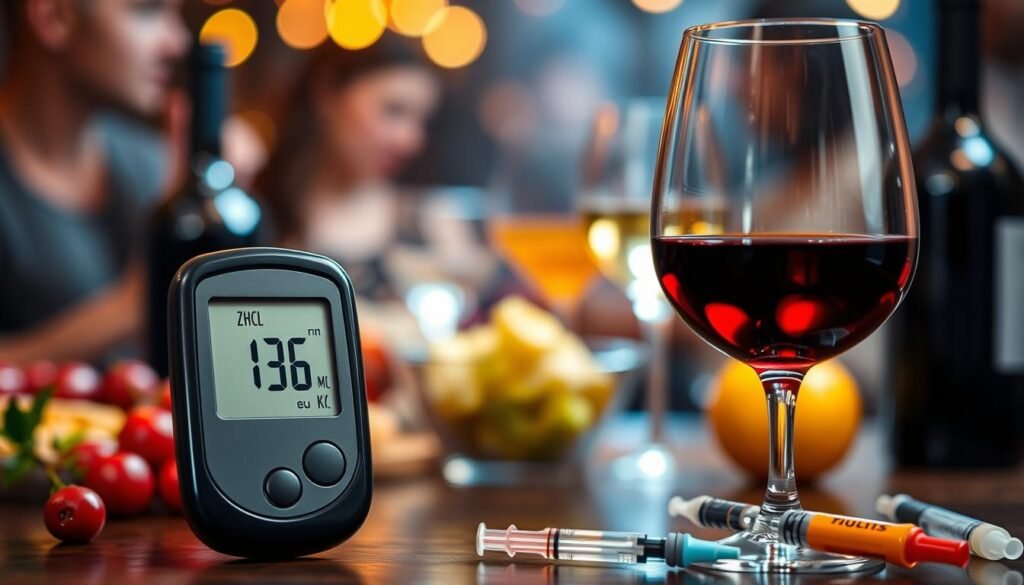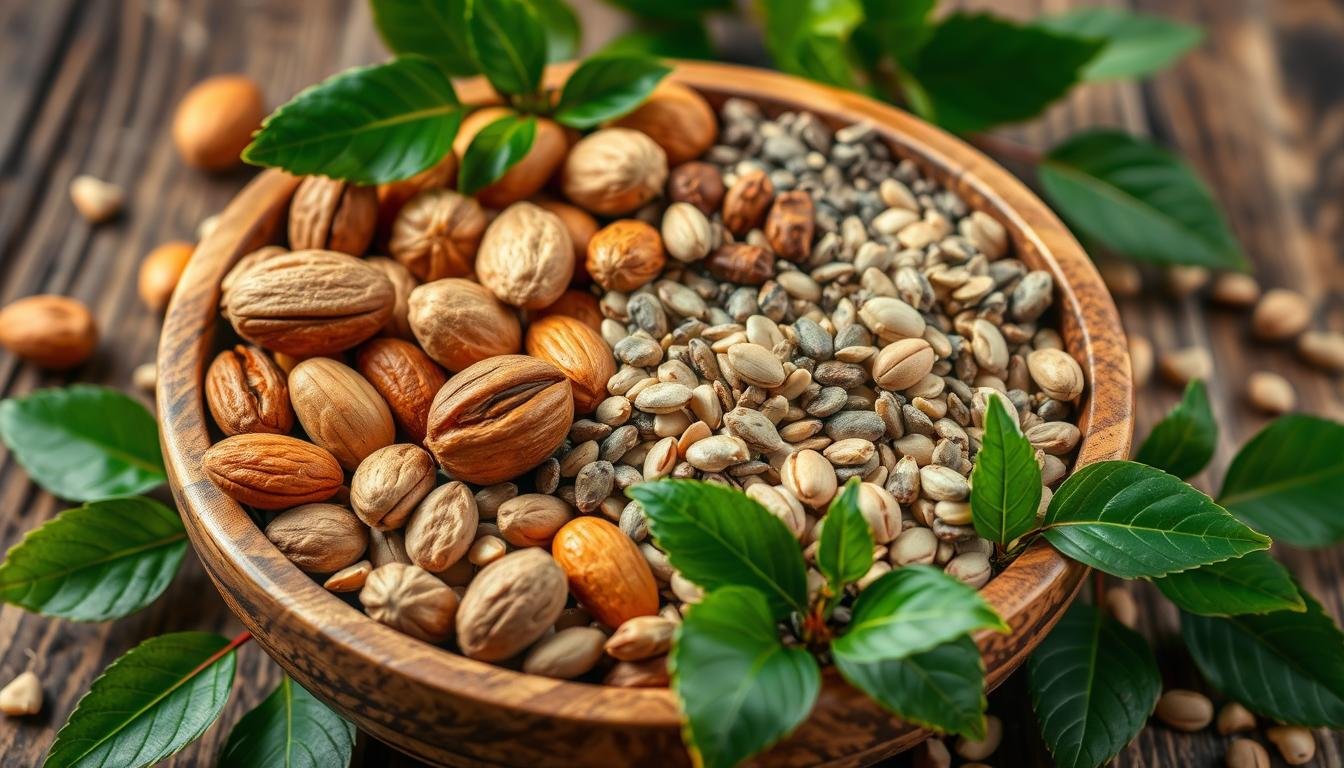Did you know folks with diabetes drink about half as much as those without it? Still, knowing how to safely consume alcohol is key. Alcohol can affect how you manage diabetes, mainly by messing with blood sugar levels and how well medications work. For people with diabetes, drinking responsibly is critical. It can make a huge difference in their health stability. This article is here to share important info on diabetes and alcohol. It aims to give valuable tips on safe drinking practices.
Key Takeaways
- Moderation is crucial; women should stick to one drink daily, while men can have up to two.
- Knowing alcohol’s impact on blood sugar is key for good diabetes care.
- Too much drinking can increase the risk of complications related to diabetes.
- Opt for drinks that are low in carbs and calories for a healthier choice.
- Before drinking, think about how alcohol could interact with your diabetes meds.
Understanding the Relationship Between Diabetes and Alcohol
The connection between diabetes and alcohol is complex. In the United States, around 16 million people have diabetes. This makes knowing how alcohol affects them very important. Most people with the disease have Type 2 diabetes. This kind usually starts in adults older than 40. It’s key to learn how to handle diabetes when drinking alcohol.
For people with diabetes, drinking alcohol can change their blood sugar in unexpected ways. Alcohol can mess with insulin, which is vital for controlling diabetes. This may cause blood sugar to drop too low, especially if they haven’t eaten much. The liver has to work on alcohol and this can affect how diabetes medicines work. Whether you’ve eaten or not changes these risks.
Drinking a lot can also cause acid to build up in the blood and make diabetes worse. It can harm fat metabolism and hurt nerves. Since alcohol affects blood sugar differently if you’ve eaten or not, close monitoring is essential. Knowing these things helps people make smart choices about drinking while keeping their diabetes in check.
The Importance of Moderation in Alcohol Consumption
Moderation in drinking alcohol is key for people with diabetes. It’s important to know what “moderate” means. For women, it means up to one drink a day. Men can have up to two. Following these moderation strategies helps keep blood sugar levels stable. It also lowers the risk of issues from drinking too much.
Studies link moderate drinking to better blood sugar control. One study with over 38,000 diabetes patients found interesting results. People who had 1 to 1.9 drinks daily had an A1C of 8.51. That’s better than the 8.88 seen in those who never drink. This supports safe drinking guidelines. Alcohol, when not overdone, was linked to lower A1C levels.
Drinking too much, though, can lead to type 2 diabetes and other health problems. Guidelines advise that everyone, men and women, stick to 14 units of alcohol a week. Being responsible means understanding how certain drinks affect you. Drinks high in carbs, like beer and cider, can spike blood sugar.
Moderate drinking helps with diabetes management and overall health. As new findings show the benefits of moderate drinking, those with diabetes should think about these guidelines for consuming alcohol carefully. It’s an important part of staying healthy.
Guidelines for Consuming Alcohol in Moderation with Diabetes
For people with diabetes, knowing how to safely enjoy alcohol is key. Moderation is essential for good blood sugar control. By sticking to certain serving sizes, one can keep risks low and maybe even see some health perks.
Recommended Serving Sizes for Different Alcohol Types
The American Diabetes Association suggests these amounts for drinking:
| Type of Alcohol | Serving Size | Typical Alcohol Content |
|---|---|---|
| Beer | 12 ounces | 5% ABV |
| Wine | 5 ounces | 12% ABV |
| Distilled Spirits | 1.5 ounces | 40% ABV |
These rules are a guide for safer drinking. Women should stick to one drink a day, men to two. Picking drinks like light beers or dry wines can help, as they have less alcohol and fewer calories.
Potential Benefits of Moderate Drinking
Moderate drinking might be good for your heart. It could also make your body better at using insulin and controlling blood sugar. Plus, red wine might increase good cholesterol (HDL) levels.
But remember, too much alcohol is bad. It can cancel out the good effects and harm your health over time. People with diabetes need to be extra careful, as alcohol can make some complications worse.
Learning about diabetes in the young can highlight why watching alcohol intake is important.

How Alcohol Affects Blood Sugar Levels
Understanding how alcohol affects diabetes is vital for controlling blood sugar. When you drink alcohol, it goes into your bloodstream and affects your blood sugar. This happens because the liver works on breaking down alcohol instead of releasing glucose. This can cause blood sugar levels to change. This is especially true if you drink on an empty stomach.
Normally, fasting blood sugar levels should be between 70 to 100 mg/dl. People with untreated diabetes may have levels above 126 mg/dl. It’s crucial to check your blood sugar often if you drink alcohol. This is because alcohol can quickly lower your blood glucose. Its effects can last up to 12 hours.
One standard drink in the U.S. has 14 grams of pure alcohol. But, how it affects your blood sugar can depend on what you drink. Here are some common drink equivalents:
- 12 oz of beer (5% alcohol content)
- 8 oz of malt liquor (7% alcohol content)
- 5 oz of wine (12% alcohol content)
- 1.5 oz of 80-proof spirits (40% alcohol content)
For those with diabetes, it’s important to drink in moderation. Women should have no more than one drink a day, while men should keep it to two drinks. Drinking too much can mean too many calories and possible weight gain. This can make managing diabetes harder.

Knowing the signs of low blood sugar is key because they can seem like drunk symptoms. This makes it hard to tell if you have low blood sugar when you’ve been drinking. Also, some diabetes drugs can increase the risk of low blood sugar if you drink. So, it’s smart to check your blood sugar before, during, and after having alcohol.
| Alcoholic Beverage | Serving Size | Alcohol Content | Calories |
|---|---|---|---|
| Beer | 12 oz | 5% | 150 |
| Malt Liquor | 8 oz | 7% | 200 |
| Wine | 5 oz | 12% | 120 |
| 80-Proof Spirits | 1.5 oz | 40% | 97 |
Risks Associated with Drinking Alcohol for Diabetics
Drinking alcohol brings special risks for people with diabetes. Knowing these risks helps manage their health better. Drinking can cause many complications, like low blood sugar and medication issues.
Hypoglycemia and Its Symptoms
Alcohol can lower blood sugar in those with diabetes. The liver processes alcohol first, not releasing enough glucose. This makes hypoglycemia, or low blood sugar, a big risk. It can happen fast and last for hours after drinking.
Knowing the signs of hypoglycemia is key. They can look a lot like being drunk. Signs include dizziness, confusion, shaking, sweating, and a fast heartbeat.
To avoid the dangers of low blood sugar from alcohol, eat before drinking. Always have sugar handy, like glucose tablets.
Impact on Diabetes Medications
Alcohol can mess with diabetes drugs, especially sulfonylureas and meglitinides. These drugs lower blood sugar, so mixing them with alcohol ups the risk of hypoglycemia. Also, drinks high in calories can cause weight gain, making diabetes harder to manage.
Always test your blood sugar before, during, and after drinking. Talk to your doctor about how much alcohol is safe for you.

Recommended Beverage Choices for People with Diabetes
Making smart drink choices is crucial for those with diabetes. It’s about finding drinks that are low in carbs and calories. This helps control blood sugar while you have fun at events. Here’s a guide on what to pick and what to avoid.
Low-Carbohydrate and Low-Calorie Options
For those looking at alcoholic drinks, there are plenty of low-carb choices that fit diabetic diets. Let’s look at some good options:
- Light beers are a good choice, with carb content between 3 to 6 grams per 12-ounce serving. Take Bud Light and Miller Lite, which have just 5 grams and 3.2 grams of carbs, respectively.
- Dry wines, including both red and white, usually have about 4 grams of carbs in a 5-ounce pour. These wines might help with insulin efficiency and might lower the chance of type 2 diabetes.
- Distilled spirits like gin, vodka, and whiskey have almost no carbohydrates. When mixed with sugar-free options, they make great diabetes-friendly cocktails.
For cocktail lovers, choose mixers like soda water or diet tonic. This helps avoid the high sugar in sweeter alternatives.
Alcoholic Drinks to Avoid
While many drinks are fine, some should be skipped for better health:
- Avoid sweet wines and dessert wines because they have a lot of sugar. This can spike your blood sugar.
- Stay away from cocktails with fruit juice. They can have as much sugar as regular soda.
- Be careful with craft beers. They often have more alcohol and calories than standard beers.
To choose drinks wisely, use these tips. Enjoy drinks without worrying too much. For deeper insights into diabetic-friendly drinks, check out this helpful guide.
Safe Drinking Practices for Diabetics
For people with diabetes, managing safe alcohol consumption is key. It ensures a balanced lifestyle. Steering clear of health risks while enjoying drinks is possible with the right steps. A major rule is to pair alcohol with food. This helps prevent low blood sugar levels. It’s very important for those on insulin or other blood sugar-lowering meds.
Combining Food with Alcohol Consumption
Eating before or during drinking helps manage your glucose better. Some good food choices include:
- Healthy fats, like nuts or avocados, slow down alcohol absorption.
- High-fiber foods such as whole grains stabilize blood sugar.
- Protein-rich foods fill you up and help control blood sugar.
Monitoring Blood Sugar Levels Before, During, and After Drinking
Keeping a close eye on your blood sugar is crucial when drinking. Diabetics should regularly check their levels. This ensures they stay within safe limits. Here’s when to check your glucose:
- Before drinking to know your starting point.
- While drinking to watch alcohol’s immediate effect.
- After drinking to catch any late-onset lows, especially hypoglycemia which can happen hours later.
Drinking with care can lead to healthier results. Studies say modest drinking may even boost insulin sensitivity. Even so, diabetics need to know their limits and health risks. For more on alcohol and diabetes, check out this resource.
The Effects of Alcohol Over Time on Diabetes Management
It’s key to know how alcohol affects diabetes over time. Regular drinking can make blood sugar hard to manage. It can also lead to weight gain. This increases the chance of health issues like high blood fats and heart problems.
Research shows that drinking a lot can raise blood pressure in type 2 diabetes patients. A study in 2020 by the Journal of the American Heart Association found something interesting. Light drinking (1-7 drinks a week) didn’t change blood pressure. But moderate (8-14 drinks) and heavy (over 15 drinks) drinking did lead to higher blood pressure levels.
Heavy drinking also affects heart health in diabetics. A 2018 study showed heavy drinkers had worse heart health measures than non-drinkers or light drinkers. This tells us the kind and amount of alcohol matters a lot for health.
Too much alcohol can also harm nerves, making diabetic nerve damage worse. This shows why it’s vital to understand alcohol’s long-term impact. Long-term drinking can make blood sugar control tougher. This could bring on more complications.
While some research says moderate drinking might help with insulin sensitivity and A1C in diabetics, caution is advised. Heavy drinking leads to big health risks. For a deeper look into diabetes and drinking, check out this detailed article.
| Effect | Moderate Drinking | Heavy Drinking |
|---|---|---|
| Blood Pressure | No increase in risk | Associated with hypertension |
| Cardiometabolic Index | Better outcomes than non-drinkers | Worse outcomes |
| Nerve Damage | Minimal risk | Significant risk |
| Weight Gain | Managed with moderation | Increased risk of weight gain |
| Insulin Sensitivity | Potential improvement | Negative impact |
Conclusion
Managing diabetes and drinking alcohol takes a careful, informed approach. It’s key to follow guidelines for drinking with diabetes to avoid health issues. For men, this means no more than 2 drinks a day, and for women, just 1.
Knowing your health status matters, especially if you have uncontrolled diabetes or high triglycerides. This knowledge matters when deciding to drink.
To stay safe and avoid negative effects, keep an eye on your blood sugar levels before and after drinking. Choose meals and sugar-free mixers when drinking. This helps keep your blood sugar stable and keeps you healthy. Consulting a healthcare professional for advice on drinking can also be a smart move.
A thoughtful, informed approach to drinking with diabetes can lead to a more enjoyable life. This includes being mindful of how alcohol impacts health. By planning and understanding alcohol’s effect, those with diabetes can safely enjoy social events.
By learning more about alcohol and diabetes, like from recent studies, individuals can better navigate its risks and benefits. Such studies show that moderate drinking might not be harmful and can even be protective, though too much is risky.


